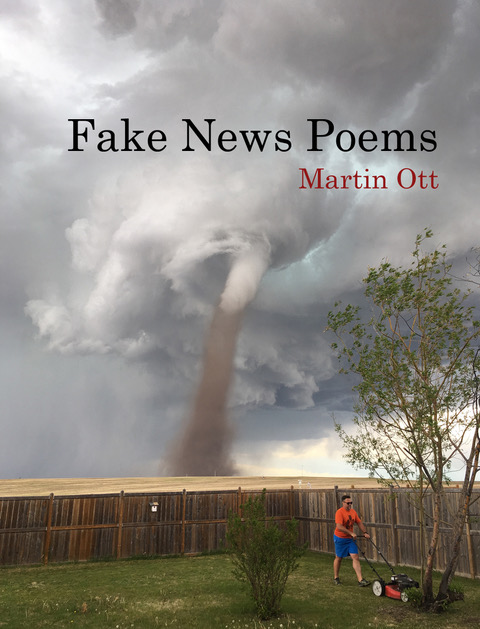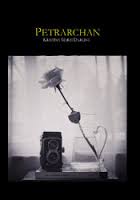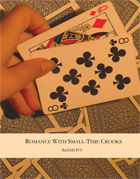
(BlazeVox Books, 2018)
REVIEW BY LEONARD A. TEMME
—
Simply put, Martin Ott’s new collection, Fake News Poems, is terrific and here’s why; the book is structured around a single idea so simple it’s genius. The idea allows immense flexibility and has roots that go back centuries, yet Fake News Poems is entirely contemporary and as fresh as tomorrow. I suspect the idea for the book came in a flash, a moment of inspiration in response to the Greatest, Most Magnificent (GMM) President of the United States (POTUS) Of All Time (OAT). So what is the book? What will you find when you read it, which I recommend you do?
It’s a kind of almanac, a collection of 52 poems, one a week for the year 2017. The title of each poem is a news headline complete with date and source. For example, the first poem in the collection is Automated Book-Culling Software Drives Librarians to Create Fake Patrons to ‘Check Out’ Endangered Titles. This headline appeared 2 January in the online zine Boing Boing. All 52 poems follow the same pattern: date, publication source, headline, and then the poem.
The poem does not present the news; the title tells us all the background we need for that. Books are in trouble again, and librarians are coming to their rescue. Beginning with a report that Fahrenheit 451 is in danger, the poem presents a dystopian vision of AI deciding which books to keep and which to cull. As the poem progresses, references grow increasingly personal until we realize that we are in love with books, each one intimate, like a friend, teacher, and lover, and we are on the verge of losing them.
Fake News Poems continues this way. For the most part, each poem fits on its own page and each has that poem-ish appearance that contrasts with the facticity of the date, source, headline / title. The contrast is certainly intentional as telegraphed by the book’s inscription from William Carlos Williams’ Asphodel, That Greeny Flower: “It is difficult / to get the news from poems / yet men die every day / for lack / of what is found there.” This reference is what Fake News Poems is really about.
Despite the close association of the GMM POTUS OAT with the phrase ‘fake news,’ to its great credit the collection explicitly references the GMM POTUS OAT in only a few poems. For example, the second poem, in response to a January 13 Mondoweiss News headline Origins of a Golden Shower, considers the rise of the GMM POTUS OAT through a series of six tercets (note the poem-ish form) to conclude with ‘musing on how the waterfall of humanity / gushed in his presence, history in the taking.’
The third poem, from 15 January, The Inquisitr (sic), riffs on the closing of the Ringling Bros Circus, quickly shifting from news to family drama. This is the poet as reader responding to the headline in nine couplets. The structure could not be more clear; the flat facts of the headline at the top of the page inspires, or provokes, the poet’s response, captured in the poem that declares itself to be a poem by its shape. This pattern delivers fifty-two doses of the good Dr. Williams’ prescribed antidote to the poison in the fifty-two headlines, which are a sampling of what we experience daily. Note, I spot checked about a dozen of the headlines via Google and they are all the real news.
The table of contents alone, the list of poems titles, is provocative reading as the news of our society, reflecting who we are and what we read; but where is the GMM POTUS OAT in this? He appears in about a dozen or so poems but almost never by name, yet his shadow lurks in much of the book. While most of the poems do not explicitly tackle politics or social issues head-on, his shadow is easy to see as consistent with the tenor of society and consequently, the tenor of the poems. The GMM POTUS OAT doesn’t have to suck all the oxygen out of the news cycle, he is part of it, fitting in perfectly, fouling the atmosphere.
There are many great poems in the collection as there are many great headlines. The cover picture is of a man in a red tee-shirt and blue shorts pushing a lawn mower through his backyard, enclosed by a tall, wooden privacy fence, the very picture of self-contained stability. But we see over the fence to the tornado filling the sky, coming his way. Meet Everycitizen. The picture refers to the 5 June, Huffington Post headline and poem title: Determined Dad Won’t Let a Tornado Stop Him from Mowing the Lawn. The poem, with as many end and inner rhymes as any rap lyric, appears on the page in eight, nice-and-tidy couplets that remind me of the steward dutifully aligning the deckchairs on the sinking Titanic. Ott doesn’t ridicule the situation, he understands it, and relates it to his father and to us. Given the current chaos, we do what we can to establish and maintain what order is possible.
The two midyear poems are worth noting because they are consistent with most of the book, not polemical or political, they capture the surprise of real life, struggling humanity trying to normalize the absurd. The L. A News of 26 June is the source for a seven couplet poem reacting to the headline: Suspect Hands Monopoly ‘Get Out of Jail Free’ Card to Deputy. The final couplet: “Love is a game with rules inked each day / The joke was that he still held out hope.” So do we. The second midyear poem, from July 5, CMBC, is a single sentence spread over a dozen lines organized into four neatly arranged tercets reacting to the headline, Sex Robots Could Make Us Lonely and Unable / to Form Relationships with Other Humans. The poem begins “When the dollhouses become our houses” and concludes with ‘when love may tear you limb from limb / there is no hope without beginning or end.” With these poems we are visiting true but tragicomic reflections of ourselves. The headlines are absurdist reality; the poems strive after order.
Like bookends, the last two poems of the book balance the first two. Recall the second poem turns the golden showers on the GMM POTUS OAT while the penultimate poem, dated 19 December from CNN, has the headline / title “Disney Adds Trump Robot to Its Hall of Presidents, which congers an image sufficient to give every reader pause: the GMM POTUS OAT surrounded by all his inferiors, from Washington through Obama. Extraordinary. Reading through the Fake News Poems we realize we finally elected the president we deserve.
The last poem, completing the year’s cycle, dated 26 December, reacts to the headline, “Man Beats up an ATM for Giving Him too Much Cash,” which appeared in USA Today. The poem feels like a coda, rounding out the year with an absurdist Chaplainesque image updated from Modern Times, futile but heroic in the way librarians protecting books heroically resist the inevitable. I can almost hear Ott reading this last poem with its many internal rhymes as rap. And so it goes.
—
Leonard Temme is a research neuropsychologist in a government research laboratory. He studied writing most extensively with Marie Ponsot, Sue Walker, Josh Davis, and Kristina Darling. In addition to his professional publications, his writing has appeared in numerous literary and small presses. He serve as Poet Laureate of Northwest Florida between 1989 and 1992.

![[PANK]](http://pankmagazine.com/wp-content/themes/pank/assets/images/pank-logo-large.png)



